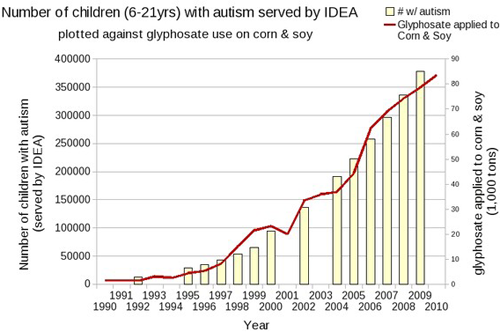
Half of All Children Born in 2050 could be Autistic
~ Dr. Stephanie Seneff, (M.I.T.)
If you're not aware of Bayer/Monsanto and their dirty dealings by now, it's time to catch up. Not only is the big-agricultural company responsible for putting small farmers out of business and selling sterile seeds, but its introduction of GMO franken-foods into the food chain (and over-use of chemical fertilizers, herbicides, and pesticides) is the number one suspect for the bee colony collapse.
If that's not enough, one senior researcher scientist at MIT suspects that glyphosate toxicity from the overuse of Bayer/Monsanto's pesticide Roundup on our food supply could result in half of the children population born in the year 2050 having autism.
Stephanie Seneff, PhD, has spent the last three decades researching biology and technology and has published over 170 peer-reviewed articles on her findings. The past few years, however, her concentration has shifted to focus instead on the relationship between nutrition and health, specifically the topics of Alzheimer's, autism, and cardiovascular diseases, and also the correlation between nutritional deficiencies and environmental toxins on human health.
Early December, Seneff spoke out at a conference to a panel discussing GMOs, shocking audience members when she stated, "At today’s rate, by 2025, one in two children will be autistic." Dr. Seneff noted that the side effects of autism closely mimic those of glyphosate toxicity, and presented data showing a remarkably consistent correlation between the use of Roundup on crops (as well as the creation of Roundup-ready GMO crop seeds) with the rising rates of autism. It seems children with autism have lower bio-markers indicative of excessive glyphosate, including zinc and iron deficiency, low serum sulfate, seizures, and mitochondrial disorders.
The audience's discomfort at Stephanie’s statings were obvious according to a fellow panelist. After the conference he reported, "All of the 70 or so people in attendance were squirming, likely because they now had serious misgivings about serving their kids, or themselves, anything with corn or soy, which are nearly all genetically modified and thus tainted with Roundup and its glyphosate."
In Seneff's report to the panel, she was quick to note the prevalent use of glyphosate and its concerns. Because it is used in soy and corn, all soft drinks and candies sweetened with corn syrup and all chips and cereals that contain soy fillers have small amounts of glyphosate in them, as do beef and poultry since cattle and chicken are fed GMO corn or soy. Wheat, too, is often sprayed with Roundup just prior to being harvested, which means that all non-organic bread and wheat products would be sources of glyphosate toxicity.

The amount of glyphosate in the previously listed foods may not be large, but the cumulative effect (especially since most Americans now consume 70% of their diet from processed sources) could be devastating. Many studies are now showing the dangerous link between human health and chemical fertilizers, genetically modified foods, and pesticides on the food supply. For example, a recent study shows that pregnant women living near farms where pesticides are applied have a 60% increased risk of children having an autism spectrum disorder.
Furthermore, many other toxic substances may be autism-inducing. Alliance for Natural Health released a report revealing the government’s deliberate concealment of the link between the MMR vaccine (for measles, mumps, and rubella) and a sharply increased risk of autism – especially in African American boys.
Other studies now show a link between a child's exposure to pesticides and autism; for example, children whose mothers smoked were also twice as likely to have autism. Research also acknowledges that environmental contaminants such as PCBs, PBDEs, and mercury can alter brain neuron functioning even before a child is born.
In addition, the number of adverse reactions from vaccines has been reported to be correlated with autism as well – though Dr. Seneff says its correlation does not match as closely as with Roundup. In conclusion, it seems quite obvious that the overuse of chemicals and other environmental toxins to the food supply is not only detrimental to the environment, but is wreaking have on mankind’s health.
No doubt autism is a complex problem with many potential causes, but Dr. Seneff's data is particularly important considering how close the interrelationship is. The fact that it is coming from a scientist with impeccable credentials also validates the demand to take it all more seriously.
Earlier last year, Stephanie Seneff presented many of the same facts at the Autism One conference; that presentation is available on YouTube.
January 14, 2015 by Amanda Froelich
